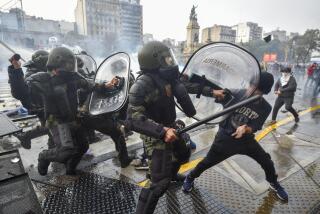Glasnost Spreads to Soviet Parliament as Lawmakers Cast Unheard-Of Vote: ‘No’
- Share via
MOSCOW — Emboldened by the Soviet Communist Party’s own calls for political reform, a small group of legislators Friday broke with tradition at the Supreme Soviet, the country’s Parliament, and voted against two laws that they believe undemocratically restrict civil rights.
Although the legislation was enacted by an overwhelming majority, those symbolic “no” votes may prove to be a historic first if President Mikhail S. Gorbachev succeeds in strengthening the Supreme Soviet and other Soviet lawmaking bodies and establishing their independence as part of his overall reforms.
But on Friday, there was both amazement and excitement when even a few people dared to declare their opposition in a forum where traditionally everyone votes “yes” and justifies it as “socialist democracy”--a declaration of support for the Communist Party.
Limits Public Protests
The first issue was a law, originally set forth in a decree by the Supreme Soviet’s Presidium, that limits public demonstrations by requiring advance permission from the government or police and increases the penalties for taking part in unauthorized protests.
Thirteen deputies voted against, and four abstained.
A buzz of excitement ran through the long hall. Other deputies turned in their seats to see who among them had the temerity to dissent, and Soviet photographers swarmed down the aisles to record the upraised hands of deputies voting against the recommendations of the Soviet leadership.
The second law, also set forth originally in a decree of the Presidium, authorizes special security troops to search the homes of suspected lawbreakers, to suppress mass protests and work stoppages and to conduct spot identity checks--all measures criticized by leading liberals as a further abridgement of civil liberties here.
Thirty one deputies opposed the legislation, and 26 abstained.
No Doubt of Outcome
With about 1,350 deputies present and voting, there was never any doubt that the government would win approval for the laws, but so stunning was the scene of even a few deputies--all originally chosen for their reliability--voting against the party leadership that “Vremya,” the nightly news program on state-run television, devoted more than five minutes to it.
While there have been occasional abstentions in past votes in the Supreme Soviet, not even veteran Soviet journalists and politicians could recall even small votes against bills since the post-revolutionary period of the 1920s.
The Supreme Soviet was just winding up its two-day, semiannual session to approve the state budget and economic development plan when a deputy from the Baltic republic of Estonia interrupted the smooth, almost featureless flow of the meeting.
Taking the floor, Pavel P. Goryunov, from the Estonian city of Tartu, described the new measures as incompatible with “true democracy” and, in a 10-minute speech, managed to raise a number of fundamental issues.
The law permitting soldiers to search homes without a warrant violates citizens’ constitutional rights, Goryunov argued, and the law restricting demonstrations conflicts with the interests of people in his republic, where mass rallies and protest meetings are held regularly.
“A law on demonstrations is necessary,” he said, “but each republic has its own traditions. There should be separate laws for each constituent republic of the Soviet Union.”
Goryunov was followed by two other deputies, one a Moscow subway worker and the other the chairman of the Kiev city council, who spoke for the legislation.
“I am amazed at claims that this law undermines democracy,” Alexander Sukhanov, the subway worker, said of the decree restricting public demonstrations. “I believe we must regulate the enjoyment of political freedom for the benefit of all the people.”
Gorbachev, sitting with other members of the Presidium on a dais at the front of the hall, remained impassive through the speeches and the votes, raising his hand in favor of both resolutions.
Tengiz N. Menteshashvili, secretary of the Supreme Soviet’s Presidium, had tried to head off the debate, outlining the decrees, explaining their intent and asking for full approval. Amendments, he said, could be introduced later, once the government had experience with these laws.
Long considered in the West to be no more than a legislative rubber stamp for Communist Party decisions, the Supreme Soviet has become much livelier this year as deputies have begun to take at face value Gorbachev’s frequent calls for greater democracy.
In May, an unprecedented open debate on legislation took place within the Supreme Soviet, forcing the government to withdraw a proposed law on cooperatives and to review taxes that the cooperatives found prohibitive. That law never came to a vote.
More to Read
Sign up for Essential California
The most important California stories and recommendations in your inbox every morning.
You may occasionally receive promotional content from the Los Angeles Times.










